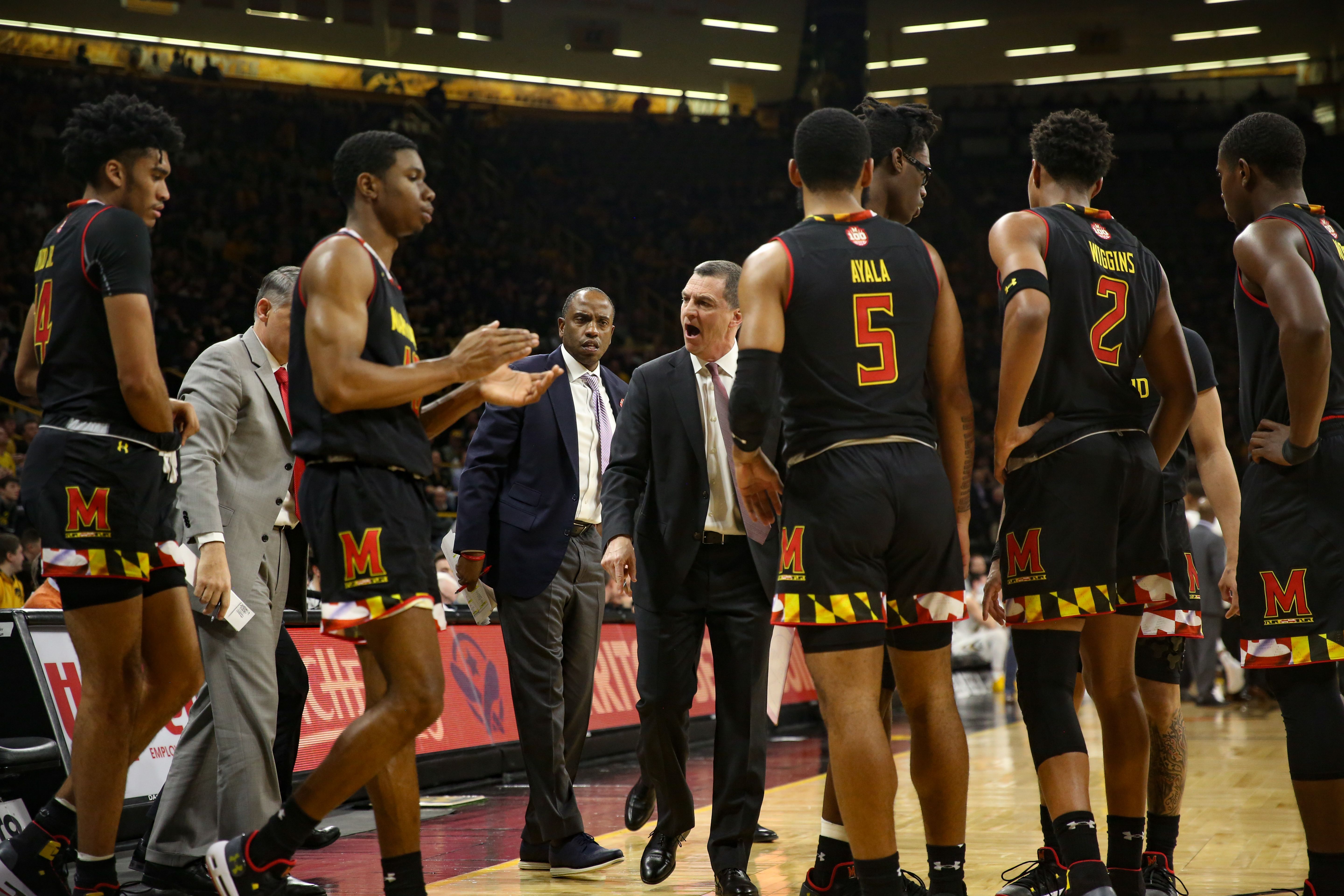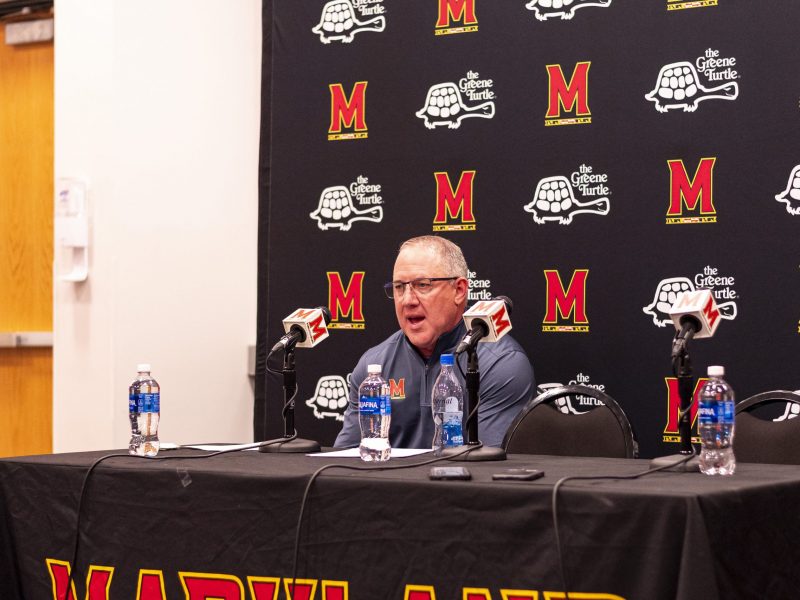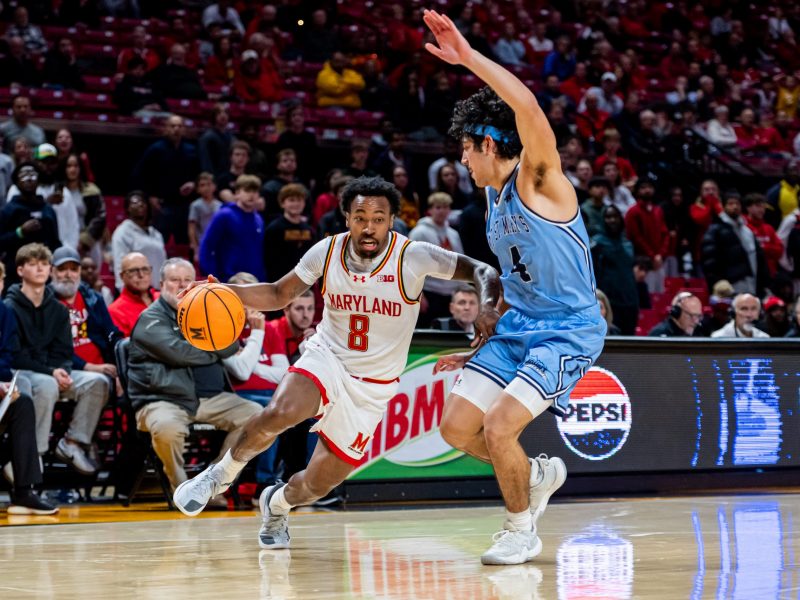Five days after falling flat on its face in a ghastly 78-61 loss to Penn State, the Maryland men’s basketball team returned home March 3 to host Michigan in a highly anticipated top-20 showdown full of postseason implications.
The Nittany Lions established the Terps’ floor. The Wolverines would remind them of their ceiling.
Maryland got out to a fast start and matched its lowest turnover total in Big Ten play, avoiding the pitfalls that plagued the team for most of the year. The Terps’ shooting performance was on par with their season average — no small feat against one of the nation’s best defenses. And Michigan, playing without starting guard Charles Matthews, missed plenty of open looks.
The result? A 69-62 loss in which Maryland was never closer than five points in the final five minutes.
Coach Mark Turgeon guided the fourth-youngest team in the nation to 23 wins, a fifth-place finish in the Big Ten and a return to the NCAA tournament. But down the stretch, the Terps were unable to differentiate themselves from the glut of teams in the conference’s second tier, making their early exit from the postseason unsurprising, albeit still painful.
“We’ve been through a lot this year,” Turgeon said after a season-ending loss to LSU in the Round of 32. “I just felt like we deserved a little bit better.”
[Read more: Switching to zone changed the game for Maryland men’s basketball, but it wasn’t enough]
The Terps showed significant growth between November and February, but rarely, if ever, seemed able to hang with the best of the best in March. After opening 16-3 — including a 7-1 start in conference play — Maryland went 7-8 to close the season, continuing Turgeon’s trend of postseason woes and teams not peaking at the right time.
Early in the year, Turgeon extolled his team’s accomplishments as it hummed through another unimpressive nonconference schedule, but the difficulty ramped up rather quickly.
[Read more: Maryland men’s basketball comes up short in heartbreaking 69-67 loss to LSU in Round of 32]
No. 2 Virginia came to College Park on Nov. 28. Not long after, eventual Big Ten regular season champion Purdue welcomed the Terps to West Lafayette. Understandably, a team that had five freshmen and zero seniors in its eight-man rotation wasn’t ready to knock off the Cavaliers or Boilermakers in the first month of the season.
“The last seven minutes, we played like a young team,” Turgeon said after the 62-60 loss to Purdue. “We didn’t play with poise, and we didn’t coach with poise.”
The game’s end matched the struggles that brought down the 2017-18 team on the road and in close games. Maryland had just two field goals in the final eight minutes against the Boilermakers, largely due to an overreliance on guard Anthony Cowan, who regressed across the board in his junior campaign.
“It’s still early,” Cowan said after the game. “We have a lot of young players. We can only get better from here.”
Forward Bruno Fernando, though, had already matured, becoming one of the nation’s best big men and making opponents take notice. The 6-foot-10 sophomore faced near-constant double teams that forced him to become an adept distributor.
Despite the increased attention from opposing defenses, Fernando led the Big Ten in field goal percentage and became the first Terp to average a double-double since Jordan Williams in 2010-11, almost certainly ensuring he won’t be back in College Park for a junior campaign.
“He’s a first-team all-league guy,” Ohio State coach Chris Holtmann said in February, accurately predicting Fernando’s postseason accolades. “You’re not going to eliminate him completely.”
Opponents’ efforts on Fernando freed up the rest of the Terps, and nobody benefitted more than fellow big man Jalen Smith. The five-star recruit battled through an up-and-down freshman campaign and struggled with the physicality of the Big Ten, but got plenty of easy buckets and rebounds as the lesser member of Maryland’s frontcourt.
Smith also keyed one of the team’s most important wins. On Jan. 2, he scored 15 points and nailed a game-winning floater to knock off an overrated, yet still dangerous, No. 24 Nebraska, finally giving Turgeon’s team a win in a close game.
“We need that for a confidence builder,” Turgeon said. “We weren’t terrific down the stretch but we were good enough to win.”
With five straight wins after that — three on the road — the Terps showed they’d improved from the early-season losses to the Cavaliers and Boilermakers. Then, a visit to East Lansing on Jan. 21 offered a chance to prove themselves against one of the best teams in the nation.
Instead, guard Cassius Winston tore Maryland apart, leading then-No. 6 Michigan State to 29 fast-break points in a 69-55 win, the first of several sobering results against top-tier teams.
Over the month of February, the Terps produced a marquee win at home over Purdue and eventually ended Turgeon’s infamous road losing streak against ranked teams. But an 11-game stretch with just three contests at Xfinity Center took its toll.
Maryland weathered losses to Illinois, Wisconsin and Michigan before mercifully knocking off a spiraling, then-No. 21 Iowa squad in Iowa City on Feb. 19.
“We made a lot of big plays,” Turgeon said after the win over the Hawkeyes. “And you have to, to beat a really good team on the road.”
In the embarrassing loss to the Nittany Lions about a week later, the Terps offered a reminder of how hard it is to beat any team.
Then came the Michigan game. On a night the Terps celebrated their 100-year history and looked back on previous golden eras, Turgeon’s squad couldn’t keep up with a Michigan program currently in the midst of one.
“We wanted this bad today,” Turgeon said, “and we just couldn’t get it.”
Despite closing the regular season with a win over Minnesota, the Terps still entered the Big Ten tournament as the No. 5-seed and 3-3 in their last six games. This made Maryland’s ugly loss to the Huskers in their first Big Ten tournament game rather foreseeable.
Then, after avoiding a true disaster — and quieting the calls for Turgeon’s firing — by squeaking past No. 11-seed Belmont in the first round of the big dance, Maryland again bumped its head on the upper bound of its potential, coming up just short against No. 3-seed LSU and leaving Jacksonville in tears.
“It’s tough for us right now,” guard Darryl Morsell said in the locker room after Tremont Waters’ game-winning layup ended Maryland’s season. “We fought, though, and I’m proud.”
Four starters — Cowan, Morsell, Smith and guard Eric Ayala — are expected to return next year. Smith may test the NBA waters but is currently forecasted to stick around for a sophomore season. The Terps will also return their top three bench options and welcome a strong recruiting class of four-star center Makhi Mitchell, his three-star twin Makhel Mitchell and three-star forward Donta Scott.
That combination of returning nucleus and impressive newcomers spells a preseason top-25 appearance and lofty expectations in Cowan’s senior year. If Maryland is to live up to them, it will have the win over the Bruins to thank, according to Turgeon.
The day after holding off Belmont, 79-77, Turgeon revisited the Wolverines game, diagnosing why his team fell short.
“Late in the game, they were better than we were, because they know what the reward is,” Turgeon said. “Those [Michigan] players have been to a national championship game. They’ve had success. We [didn’t] know what the reward is. Now, the guys are starting to.”
But Maryland has just four NCAA tournament wins in Turgeon’s eight seasons, and he’s never made it past the Sweet 16. So regardless of how experienced or talented their roster is, or how much improvement they make over an offseason, it’s fair to wonder if the Terps will ever get past the wall they hit in 2018-19 with him at the helm.
“Being so close to reaching the Sweet 16 and going home, it’s motivation for the summer,” Morsell said. “The young guys, they came in this year and gave it everything they got.”



